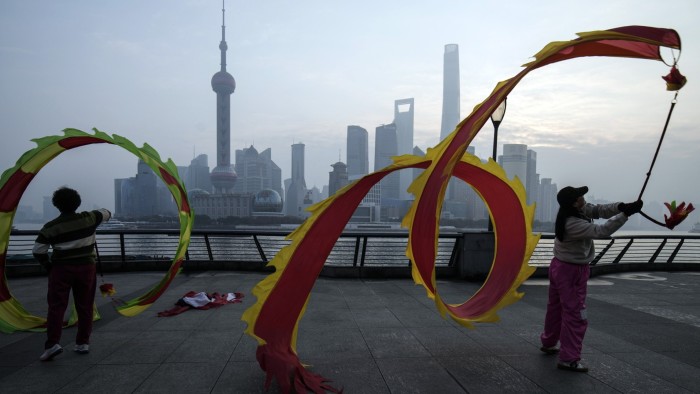This article is an on-site version of our FirstFT newsletter. Subscribers can sign up to our Asia, Europe/Africa or Americas edition to get the newsletter delivered every weekday morning. Explore all of our newsletters here
Today’s agenda: France’s new finance minister; UK housebuilding slump; EU’s stored gas usage; Mozambique political turmoil; and love lost for dating apps
Good morning. We begin with the world’s biggest private equity groups, which have been unable to sell or list their China-based portfolio companies this year as Beijing’s crackdown on initial public offerings and a slowing economy leave foreign investors’ capital trapped in the country.
What the data shows: Among the 10 largest global private equity groups with operations in China, there is no record of any having listed a Chinese company this year or fully sold their stake through an M&A deal, according to figures from Dealogic. It is the first year for at least a decade where this has been the case, though the pace of exits has been slow since Beijing introduced restrictions on Chinese companies’ ability to list in 2021.
Why it matters: Buyout groups rely on being able to sell or list companies, typically within three to five years of buying them, in order to generate returns for the pension funds, insurance companies and others whose money they manage. The difficulties in doing so have in effect left those investors’ funds locked away, with future returns uncertain. Read the full report.
Here’s what we’re keeping tabs on today:
-
Moldova: Pro-EU president-elect Maia Sandu is sworn in. Her narrow victory, despite alleged Russian interference, puts the country on a path to EU membership.
Five more top stories
1. France’s new prime minister François Bayrou has selected Eric Lombard, head of state-backed financial group Caisse des Dépôts, as finance minister, entrusting him with devising a budget that can pass the country’s raucous hung parliament. The appointment came after days of wrangling between Bayrou and President Emmanuel Macron. Here are the other officials in the new cabinet.
2. The UK’s listed housebuilders are on track to build the fewest new homes for sale in a decade as planning rules and high mortgage rates hold the market back despite the new Labour government’s push to increase housing supply. The sector is forecast to complete just over 50,000 homes this year, according to a Financial Times analysis, the lowest level of output since 2013.
3. The EU is emptying its gas storage facilities at the fastest pace since the energy crisis three years ago as colder weather and a decline in seaborne imports raise demand. The volume of gas in the bloc’s storage sites has dropped 19 per cent from the end of September, when the refilling season ends in gas markets, to mid-December, according to an industry body. Read the full report.
4. Mozambique’s highest electoral body confirmed the ruling party’s controversial election victory despite allegations of vote-rigging, reigniting the largest anti-government protests to hit the gas-rich country since independence. The announcement sparked a new round of unrest in the capital Maputo, with thousands taking to the streets.
5. Airlines on both sides of the Atlantic are bracing for their busiest Christmas season. In the UK, carriers will fly 6.1mn seats between December 20 and January 2, a 5 per cent increase on the previous record set in 2019, according to aviation data, while a record 54mn passengers are forecast to fly on US carriers between December 19 and January 6. Here are the top destinations.
The Big Read
The world’s biggest online dating companies are in crisis as women and younger users increasingly look towards niche apps and real-life meets — or even opt out of romantic relationships altogether. Why have users fallen out of love with dating apps?
We’re also reading . . .
-
‘Waste of time’: The FT spoke to ministers, business leaders and Labour MPs to piece together what went wrong for Sir Keir Starmer after his landslide election victory.
-
Dispatch from Syria’s Latakia: In the Assad dynasty’s home province and one-time stronghold, many fear the regime change marks the start of a cycle of disempowerment and retribution.
-
Dax bull run: Germany’s own “magnificent seven” have driven a strong rally in the country’s stock market this year, defying the gloom enveloping the domestic economy.
-
Misinformation: A Russian online ad agency with a London affiliate has been implicated in influence campaigns in France, Germany and Romania.
Chart of the day
Three more EU member states — including the most populous, Germany — have joined the list of countries with “ultra-low” fertility rates, highlighting the extent of the region’s demographic challenges. Birth rates have fallen even in countries where family-friendly policies had previously helped boost the number of babies.
Take a break from the news
In our society, momentous news tends to be shared first with those in significant or high-profile positions, as it has been throughout history. So it is notable, writes Enuma Okoro, that a group of “lowly” shepherds was deemed important enough to receive the news of the birth of Jesus. The humble characters of the Nativity story have much to teach us about being open to ideas of spirituality.

FirstFT will be taking a break tomorrow but we’ll be back in your inboxes on Thursday. Thank you for reading, and happy holidays!





